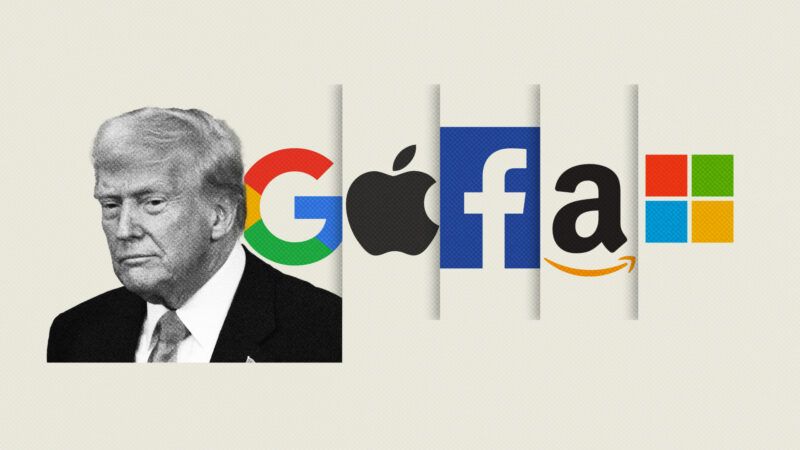Trump's Love-Hate Relationship With Big Tech
If Trump wants to encourage domestic investment, his antitrust appointees should ditch their Big Tech prejudice.

Apple announced on February 24 that it will spend and invest more than $500 billion in the U.S. over the next four years. President Donald Trump took to social media to credit his administration for the announcement. Without his policies, the president said, Apple "wouldn't be investing ten cents." However, Trump's antitrust and trade policies could be the very thing that prevents other large firms from making similar announcements.
Apple's plans include a 250,000-square-foot server manufacturing facility in Houston, which will power Apple Intelligence, its proprietary generative AI; doubling its U.S. Advanced Manufacturing Fund from $5 billion to $10 billion; hiring 20,000 Americans; and opening an Apple Manufacturing Academy in Michigan to help businesses implement AI and smart manufacturing techniques. A financial analysis conducted by The Wall Street Journal concludes that "Apple's announced figure is in line with what one might expect the company to be spending anyway."
Trump touted Apple's domestic spending commitment nonetheless, and Vice President J.D. Vance chastised European leaders for "tightening the [regulatory] screws on U.S. tech companies with international footprints" at the Paris AI Summit earlier this month. At the same time, Trump's Federal Trade Commission (FTC) and Department of Justice (DOJ) are perpetuating the presumptively anti–Big Tech antitrust framework implemented under Joe Biden.
Andrew Ferguson, Trump's confirmed chair of the FTC, announced a public inquiry into Big Tech censorship on Thursday. The FTC's request for public comment asks respondents to consider whether "platforms' adverse actions made possible by a lack of competition" and to what extent "platforms [used] their dominance…to prevent competition from platforms with different moderation policies."
The DOJ brought two major antitrust cases against Google and one against Apple during the Biden administration. Abigail Slater, Trump's nominee for assistant attorney general of the DOJ's antitrust division, said at her Senate confirmation hearing that she was "not familiar with the details of the Antitrust Division's lawsuits against Google and Apple." Two days before Slater's hearing, the Tech Oversight Project, a nonprofit "dedicated to reining in Big Tech," described her as "a strong candidate to [hold] Big Tech price gougers and monopolists accountable." Slater's hearing responses confirm this description: She responded in the affirmative to Sen. Sheldon Whitehouse's (D–R.I.) question if she'd "prioritize enforcement against Big Tech" and told Sen. Chuck Grassley (R–Iowa) that the tech industry should be a focus of the antitrust division.
Trump credited his threatened tariffs on Mexico with stopping Apple's construction of two semiconductor fabrication plants in Mexico while speaking to reporters on Friday. Trump said that "the tariffs are amazing," but encouraging firms to produce where they otherwise would not is nothing to celebrate. If Apple decided to build its plant in Houston in response to Trump's pending tariffs, then manufacturing in Mexico would have been less expensive in its absence; some percentage of these lower production costs would have translated to cheaper Apple products for American consumers. In celebrating tariffs as a tool of industrial policy, Trump is really celebrating higher prices. Prices are further hiked when tariffed countries respond in kind: China banned the export of rare materials used in semiconductors, solar panels, and batteries to the U.S. in December 2024 following American export controls on chipmaking tools.
Instead of engaging in distortive trade policy that makes Apple products more expensive, Trump can make domestic production more attractive by reducing the regulatory burden. Miring firms like Apple and Google in expensive antitrust litigation does the opposite.


Show Comments (9)